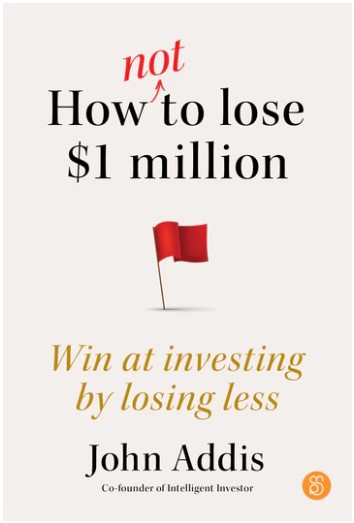This is an extract from John Addis’ new book How Not to Lose $1 million. The extract itself was first written in August 2011.
***
‘One broker (The Clown of Collins St) came in yesterday saying “Capitulation over … now’s the time to buy ... expect a short-term rally of 3–4%”. D***head. Typical of the “guess, guess and guess again” value add of some financial professionals.’ Marcus Padley, Crikey, 9 August 2011
As things transpired, the d***head was right. A few hours after those words were published, the ASX All Ordinaries index had risen not 3 or 4 percent but 5. Whether stocks are rising rapidly or crashing, the market makes fools of us all.
Value investors implicitly understand that cheap stocks are a product of pervasive fear just as expensive stocks are an expression of greed. But in both cases, when the time comes to act, many of us stumble.
Often, it’s not our value investing skills that fail us but our psychology. What follows is a dose of psychological fortitude to help you avoid critical mistakes and profit from the opportunities in collapsing share prices.
1. Hold cash and ensure it is quickly accessible
Affording you the ability to act quickly, cash is not a dead asset. When prices are cheap and opportunities plentiful, cash is the source of future returns. If you haven’t accumulated much of it during the good times, take some tough decisions. Don’t hold stocks in your portfolio just because they’ve been there for years when better opportunities exist outside it.
Ensure that cash is not stuck in a three-month term deposit or requires an overnight bank transfer before you can use it. It should be available through your broking account at a moment’s notice.
2. Have a watch list with buy prices
A watch list is a great technique to sideline emotions that can prevent you from acting. If you know what you want to buy and at what price, you’ll be more likely to act when the time comes.
Developing a watch list gets the commitment principle working in your favour, especially if you show the list to friends or display it in a prominent place so you get social proof working for you as well.
3. Prepare an action plan; buy gradually
Now you’ve got the cash and an idea of what you want to buy at a particular price and yield, you need an action plan. This technique relies on you committing to a course of action before gut-wrenching emotion takes over.
Do not pile in all at once. Buy gradually, acquiring more shares as prices fall. Buying at the point of maximum pessimism is a great ideal but impossible to confidently execute without the benefit of hindsight. Buying gradually in fearful times and sticking to high-quality companies at prices cheap enough to offer a good margin of safety is a more realistic aim.
4. Stick to portfolio limits
There’s every chance that a few of the stocks in your portfolio won’t work out as you expect. That is the nature of investing. These failures might do to a highly concentrated portfolio won’t be fatal to a more diversified, well-structured one.
As in many areas of life, we need to stay alive long enough to get lucky. Don’t kill your portfolio by loading it up with a few highly speculative stocks. Concentrate on the high-quality businesses and diversify, paying close attention to portfolio limits.
5. Challenge your evolutionary impulses and buy anyway
We’re programmed to respond to fear because in the past it was a successful way of not being eaten. In the sharemarket, fear inhibits rational, profitable action.
***
Whilst these practical steps help you to act when the time comes, we also need to reassert a few fundamental investing truths that conflict with our typical reactions to uncertainty and rapid share price falls:
- If you want certainty, you’re going to have to pay for it. When everything’s going well, you won’t get anything cheap. Bargains are a product of a climate of fear. If you want to buy cheap stocks, you must feel the fear and buy anyway.
- Accept that prices may fall after you’ve bought. You can’t pick market bottoms or tops, but if you’re buying high-quality businesses cheaply, that shouldn’t stop you from buying more when prices fall further.
- Separate price falls from underlying business performance. The market can be irrational. To avoid getting caught by the herd, focus on business performance, not macro issues (important as they may be) or media headlines. This is the major, long-term determinant of share price direction.

John Addis is the co-founder of Intelligent Investor, a value-oriented investment research house and funds management firm. John’s new book How Not to Lose $1 million, published by Major Street, is out now. Firstlinks readers can use the promo code MORNINGSTAR25 at checkout for a 25% discount.